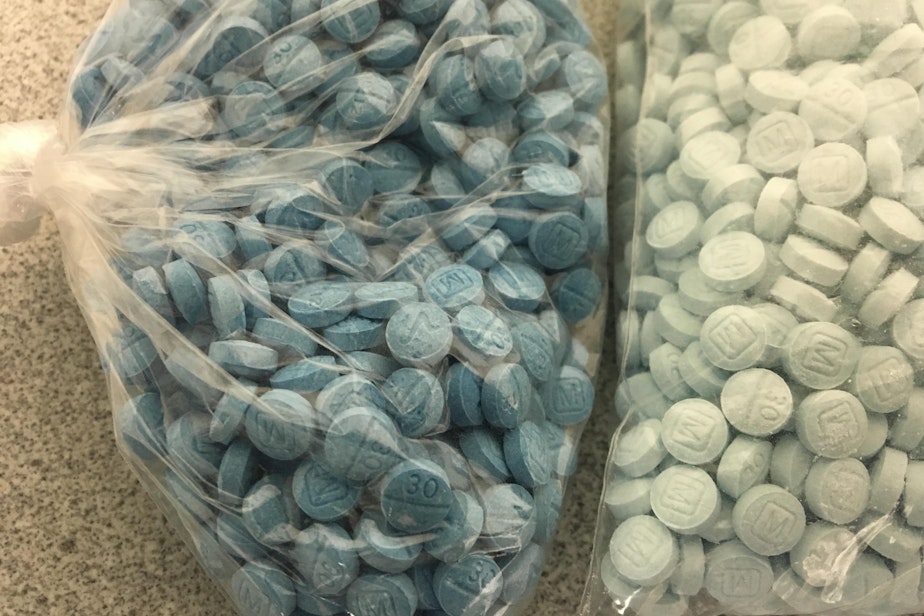A cautionary tale of teen fentanyl abuse prompts advice for parents and friends

Over the last week, KUOW reporter Anna Boiko-Weyrauch has been reporting on the surge of fentanyl here in the Puget Sound region. We heard how the synthetic opioid in pill form has flooded the illegal drug market, killing more people than ever before.
Anna brought us a profile of a 17-year-old who became addicted to fentanyl and his recovery journey ahead. Teenagers and fentanyl pills are becoming a more common and dangerous combination here in Washington state. Anna told KUOW’s Kim Malcolm about what parents need to know to keep their kids safe.
This interview has been edited for clarity.
Kim Malcolm: As the mom of a couple of teenagers, this story just grabbed me. Let's begin with the basics. Tell us about this drug and why it's so dangerous.
Anna Boiko-Weyrauch: Fentanyl is an opioid, like heroin, but it's illegally manufactured in a lab, then pressed into pills. It often comes in these little blue pills, which are made to look like an oxycodone pill. Now, fentanyl is extremely potent. Just a few tiny grains of it can kill you. The pills have variable quantities of the drug in them, so you really don't know what you're getting.
What are the signs that people should be looking out for?
With fentanyl, and really with any drug, parents should look out for changes in the behavior of their kids, changes in friends, and drug paraphernalia around like foil with burn marks. The parents of the young person I interviewed wanted other parents to know about the smell of fentanyl pills, specifically, because it took them by surprise. They wanted to tell parents to be on the lookout also for big personality swings in their kid, for example, their kid started to withdraw a lot from the family.
Sponsored
What kinds of treatment options are out there for teens?
I've heard that, compared to adults, it's just harder for younger people with opioid use disorder to find treatment in the area. There are just fewer options. And treatment is not just about inpatient rehab. It's also outpatient treatment. It's also about counseling and mental health care. I spoke with Lara Okoloko. She has a private therapy practice in Edmonds, and she works with a lot of parents who have young people with opioid use disorder:
“It is difficult for families to figure out how to navigate both cost issues, but also availability and long waitlists. There's a shortage of therapists in our area. And so, people might find that they're calling dozens and dozens of therapists to find someone who has an opening.”
I was really struck by that moment in your story where the mom talked about the advice she was getting from people who cared about her and her family. They were telling her, essentially, to hold the line, to cut off their son, and she didn't.
That's another important thing Lara Okoloko mentioned, that it's actually not helpful to cut family members off. It's not helpful to kick them out. That saying ‘letting them hit rock bottom’ is actually an outdated myth. Instead, it's actually much better to keep in touch with your child, your loved one with opioid use disorder, and to help them get treatment:
Sponsored
“Having a family member who's willing to support you, make phone calls with you, drive you to appointments, that kind of helpfulness is not harmful. And being loving, being kind, being helpful, is not enabling people in their addiction.”
She says that there is hope. For example, there are very effective medications for opioid use disorder -- such as buprenorphine, methadone, and naltrexone -- and they really do help some people.
What about prevention? You were talking with doctors and other experts about how to prevent people from using fentanyl in the first place. What were they telling you?
Starting talking and intervening early is very important. Over the years, I've interviewed a lot of people with opioid addiction and it's extremely common for people to tell me that they started using in early adolescence, somewhere between the ages of 11 and 13 years old. That's a key time, because young people think they're invincible, they're especially influenced by their peers, and their brains are undergoing this incredible development, so they're very vulnerable.
The earlier young people start experimenting with drugs and alcohol, the more likely they are to develop a long-term problem. The solution to that is to get young people to delay when they start experimenting. Therapist Lara Okoloko says this is the way to do that:
Sponsored
“You keep a close relationship, you keep a close eye on your kid, you know who their friends are, and you really work hard to develop a relationship in which you have firm but kind and loving communication.”
Okoloko also says parents can do a lot to make it clear, very early on, that they don't approve of drug and alcohol use, and those conversations do make a difference.
What else do you want our listeners to know about this?
Recovery from drug use is possible. With fentanyl, the stakes are a lot higher because it is so potent and addictive. Smoking fentanyl takes over people's lives more quickly than other drugs. But with any drug if you suspect something is up with your kid or with your loved one, it's important to act quickly and that's especially true with fentanyl.
Sponsored
Resources:
Lara Okoloko recommends the groups Sober Families and Smart Recovery as resources for families with an opioid-addicted loved one.
She says most of her clients read the book, Beyond Addiction: How Science and Kindness Help People Change.
More resources for family and friends from the University of Washington Addictions, Drug & Alcohol Institute.
Listen to the interview by clicking the play button above.


